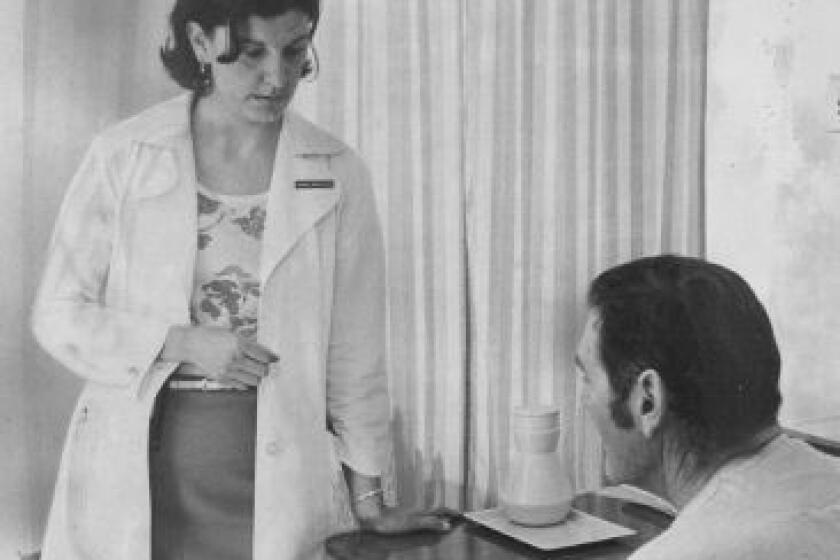Al Rojas, staunch defender of farmworkers and prominent member of UFW, dies
- Share via
While the United Farm Workers union prepared to commemorate the 50th anniversary of the Delano grape boycott, Al Rojas was too busy plotting his next move to partake in the festivities.
There was no doubt the longtime, scrappy organizer understood the importance of the anniversary. The late 1960s boycott organized by Filipino and Latino laborers marked a milestone for farmworkers and revolutionized the labor movement in the United States. It led to the passage of the California Agricultural Labor Relations Act of 1975, which established collective-bargaining power for farmworkers in the state.
But Rojas knew there were still too many laborers who needed help.
“No time to celebrate. Agricultural workers in California and Mexico are still unorganized!” Rojas wrote in a 2016 letter to the UFW days before the celebration. “Today there is an anti-labor offensive not only against farmworkers but against all workers — from postal workers who face privatization to teachers who face charters and union-busting along with more segregation in the schools.”
Working within the shadows of titan labor organizers, Rojas pushed for labor justice across the nation and in Mexico. He believed rank-and-file workers should wield power over their labor and lives.
Marion Moses, a leader on pesticides who advocated for the health and safety of farmworkers, was 84.
“Al Rojas struggled during his entire life against the exploitation and abuses of the transnational agricultural enterprises,” the Mexican Electrical Workers Union wrote in a press release. “Organizing unions, strikes and boycotts against the rich, demanding justice for the proletarians; he never gave in to racism, discrimination and white supremacy. Al always lived with the joy of his Mexican roots.”
After decades of work, Rojas died of kidney failure on March 20, his daughter Desirèe said. He was 82.
Rojas was born and raised in the San Joaquin Valley by his family of farmworkers. His parents migrated from Mexico to work throughout California’s agricultural valleys under the bracero program. Following their footsteps, he quickly learned the harsh realities of working in the fields. Abysmal pay. Unpredictable weather conditions. Shoddy equipment — if any was provided.
Soon his hands mirrored his father’s: dry, cracked and bruised. He knew this life wasn’t adequate as it stood for any human being.
Rojas organized along the coast with local activists and helped found the United Farm Workers Independent Union, IBT, until he took his advocacy for adequate pay and working conditions to a national level. He became an early, prominent member of the UFW, joining Cesar Chavez and Larry Itliong, as the Delano grape boycott gained traction. Organizers were being shipped across the nation to rally more support for the movement and Rojas was assigned Pittsburgh.
In the late 1960s, without any specific game plan but to orchestrate a boycott, he uprooted his family for the cause. The big city came as a shock, but Rojas successfully turned Pittsburgh into an active support hub for farmworkers back in California. He mobilized a team to picket at local markets and distribute leaflets and learned how to utilize local newspapers and television stations to his advantage. His wife at the time, Elena, and children would often join in during demonstrations.
“He was an organizer with the farmworker movement in every sense of the word,” said LeRoy Chatfield, former executive director of the National Farmworkers Assn. “Whatever the assignment was, Al was an activist and damn good.”
“We lived off donated food, clothing, housing and we got nothing but love from people who respected my parents,” said Desirèe, who would go on to follow in her father’s footsteps. “They did what they did because they were zealots for the civil rights of farmworkers.”
Rojas left the union after a decade. He believed the UFW had lost sight of its original mission, but he continued his work through other avenues. He worked as a California state deputy labor commissioner and founded organizations championing human rights such as North Americans for Democracy in Mexico. He also served as vice president for the Sacramento chapter of the Labor Council for Latin American Advancement.
During his final years of activism, he joined thousands of farmworkers at Sakuma Brothers Farms in Washington state and San Quintin Valley in Mexico in their boycott against Driscoll’s, the world’s largest berry distributor. During a May 2016 Bernie Sanders rally in Stockton, Rojas urged the Vermont senator to use his platform to help spread the word. Later that month, Sanders talked about the exploitation laborers face during a campaign stop in Visalia.
When Rojas permitted himself time to rest, he enjoyed basking in the sun, eating juicy oranges in his children’s gardens. An avid storyteller, he loved recounting his life history to his grandchildren.
During a hot summer day, he closely watch Desirèe prune her fruit trees. Sometimes, he’d show her where exactly to snip a branch or bud.
But this time, he left his daughter’s side and returned to his chair. He let the sun warm his face and told her, “you did pretty good today. You pruned that tree pretty good.”
Rojas is survived by his four children, Debra, Albert Jr., Desirèe and Shalom; and numerous grandchildren and great-grandchildren.
More to Read
Start your day right
Sign up for Essential California for the L.A. Times biggest news, features and recommendations in your inbox six days a week.
You may occasionally receive promotional content from the Los Angeles Times.








